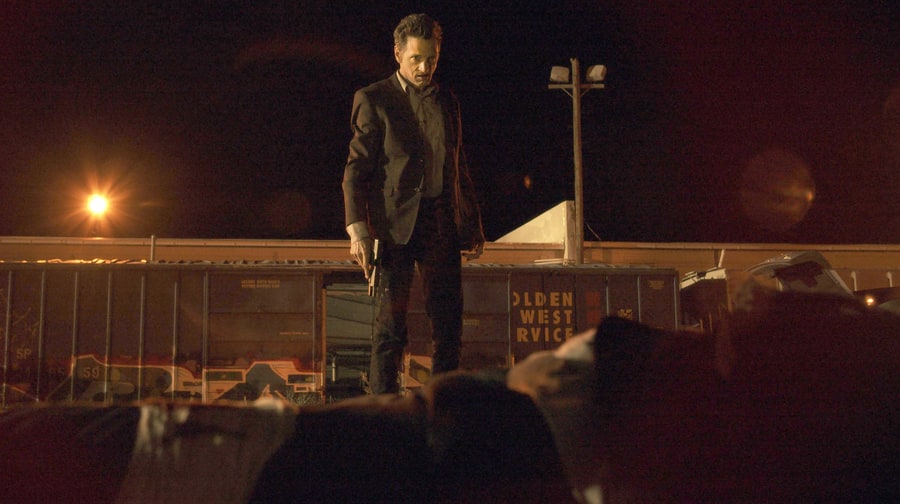Shane Black walked into a movie, nodded to the Coen Brothers who were busy wrestling with Quentin Tarantino.
This is what Small Town Crime feels like.
While the one sentence pitch is not usually a helpful way to speak about film, Small Town Crime is the exception to this rule. To really encapsulate the madcap approach, as well as the quirky pacing and tone, one is forced to grasp at pieces of other cinematic comparisons in the hope of adequately describing the film. This is simply because Small Town Crime is unique, it is a conglomerate narrative that slips in and out of several different types of genre; all while somehow residing comfortably under the shadowy umbrella of crime-noir.
Our protagonist for the film, played by venerable John Hawkes, is an alcoholic, down on his luck, ex-police officer; as this kind of film usually dictates. He finds himself in the middle of all kinds of nefarious dealings after he finds a woman clinging to life on the side of the road. The film then unwraps as these type of crime films typically do, a clue here, a revelation there, until finally we find ourselves in a showdown of bullets and blood. What makes the film unique, however, is the way in which the narrative unfolds. It is equal parts gritty drama, witty dialogue, and dark comedy. The tone shifts with minimal effort and the pacing somehow stays intact while the film weaves its way through several subplots and dances through dialogue that plays with elements of pure comedy, pure tragedy, and everything in between.

The truly impressive thing about the film, though, is not that it attempts these shifts, it is that these shifts are so effective. The film doesn’t work in spite of these different elements, it works because of them. What could have been a standard, down on his luck, P.I. story becomes a fever dream of successful filmmaking that combines elements of the work seen from the directors listed above. That is not to say this film is a puzzle of derivation. It is not pieces of other source material. No, this film has its own narrative and voice.
Part of that voice is in the performance of this cast. From John Hawkes, Anthony Anderson, Michael Vartan, Robert Forster, and all the way down to Octavia Spencer’s small but effective appearance this film is full of fantastic performances. Most of the shifts in tone and genre are successful due to the delivery and performance of this cast. They never seem lost or uneven, which keeps this film afloat and speeding down the narrative waterway.
The other part of the film’s narrative voice is within the world-building. As most great crime-detective stories go, this film drips with atmosphere and character building. It would be bold to compare our protagonist here to a Sam Spade or another seminal fictional, noir detective, but there is a real sense that this an origin story. The film revels in his development and in the development of his world. It would not be surprising to see another installment, ‘Large Town Crime’ perhaps, pop up in the future.
So while Small Town Crime can be described by a one sentence pitch, the film itself is an experience that is far more layered and engaging than that. It is rare that one leaves a movie that ends with bloodshed and ultra-violence with a grin, but Small Town Crime manages to do just that.


